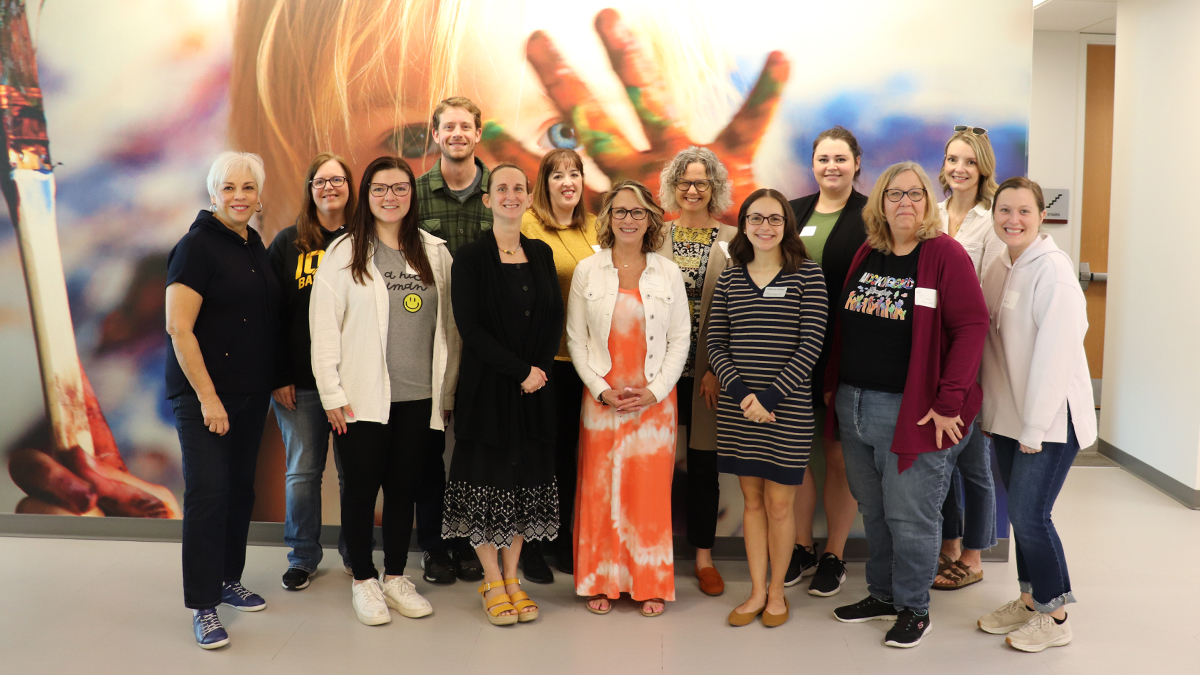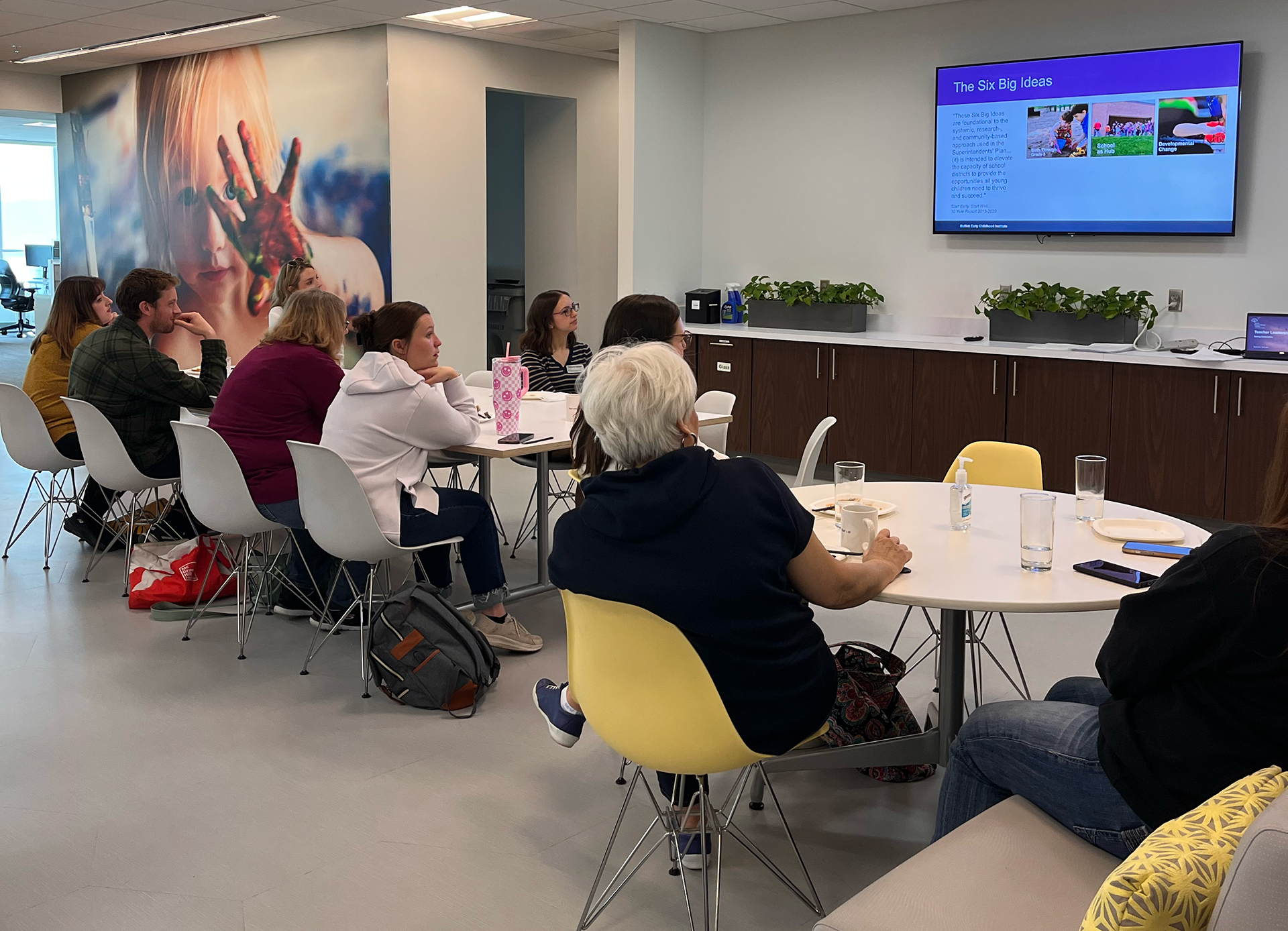
Leadership in education doesn’t only happen in front offices or district buildings—it happens every day in classrooms and beyond. Every teacher leads: in their instruction, in the way they mentor students, and in how they collaborate with their colleagues and community.
“If you're in front of a group of students all day and you're working with kids all day, you're definitely already a leader,” said Ben Thomas, an early childhood teacher at Omaha Public Schools’ Liberty Elementary in downtown Omaha.
The Teacher Leadership Network (TLN), first launched in January 2024, recognizes just that.
TLN is a cohort of 16 educators, all committed to professional growth and collaboration, from six Omaha metro school districts—Omaha Public Schools, Millard Public Schools, Douglas County West Community Schools, Westside Community Schools, Bellevue Public Schools, and Ralston Public Schools.
It was created to give teachers the background of the Superintendents' Early Childhood Plan and allow them to have a voice in the work that is being implemented at their schools around the School as Hub approach.
“I enjoy being someone who makes a difference, and so the Teacher Leadership Network felt like just another great opportunity to do that,” said Kelsey Nabity, a math intervention specialist at Douglas County West Elementary in Valley, Neb. and TLN member. “The Superintendents’ Plan really aligns with our district plans and I think TLN has really allowed me to see that alignment between why we're doing what we're doing.”
The Superintendents’ Plan is a collaborative effort of the 11 school districts in metro Omaha that make up the Learning Community of Douglas and Sarpy Counties to develop early childhood programs, especially for children living in poverty. The Buffett Early Childhood Institute at the University of Nebraska provides leadership and support for the plan.
At the core of the School as Hub approach is the idea that schools can serve as a “hub” to connect children and their families to resources within and beyond school walls. Ten schools participate, impacting more than 2,800 children in PreK to Grade 3.
Led by the Buffett Institute, TLN has met monthly over the last 18 months for conferences, professional development, and learning workshops. They have completed book studies, developed leadership skills, and brought what they have learned back to their schools.
“Being able to learn from teachers across districts and hear what they were doing in their schools and districts around leadership, instruction, and family and community partnerships, allows for the sharing of ideas to expand and enrich the work that was currently happening in their schools,” said Mary Beth Pistillo, an early childhood specialist at the Buffett Institute and coordinator of TLN.
For members, the ability to connect across districts offers chances to learn from each other.
“When we talk through some of the things that are going on in our schools, we see that we may be working in different districts, but we're dealing with very similar things,” said Thomas.
 The April 2025 Teacher Leadership Network event
The April 2025 Teacher Leadership Network eventThis collaboration allows time to share insights, ideas, and the benefits of School as Hub programming.
“I feel DC West does a really good job of being just an additional part in our community,” said Nabity. “We're not just a building to drop your kids off, we'll teach them, and we'll send them home. We are constantly doing things to help support our families, not just educationally. And I think that that's something the Superintendents’ Plan has done for us through the School as Hub model.”
Outside of the meetings, members are implementing what they’ve learned at their school. They have joined their school’s leadership team and facilitated special projects aligned to the School as Hub approach.
“We've had collaborative meetings with district leaders to look at how we can support the Superintendent's Plan, and I feel like I've gotten more touchpoints with them that I would have never had before,” said Thomas. “It's motivated me to be the grade-level team lead at my school and do things that I wouldn't necessarily have done.”
An important component of the TLN is incorporating early education into the K-12 system. Too often, discussions about education begin at Kindergarten, but strong K-12 systems begin with a strong early learning foundation. That creates continuity and strengthens outcomes for all students.
“As kids go up in their schooling, it's become more standards-based, which isn't necessarily aligned to child development in the same way that early childhood teachers are looking at developmental milestones for students,” said Thomas. “So, I think bringing that lens into Kindergarten, first, second grade is why it's really important for preschool teachers and early childhood people to be involved.”
In late April, TLN celebrated the end of its first cohort and capped off 18 months of learning and growth. Beginning in June, the Network will welcome members from six more schools in OPS and add members from the Elkhorn and Bennington districts.
“Twelve of our original 15 teachers will be continuing with the program, and we’ll be inviting new teachers as well,” said Pistillo. “We plan to increase in-person meetings and conduct school site visits to explore the various School as Hub models and learn from one another.”
When we see every teacher as a leader, we unlock the potential for meaningful change from within the classroom. Teachers shape their students and school culture.
“Any teacher can be a leader,” said Nabity. “You don't have to have the degree. You don't have to have a certain title. You don't have to have certain duties on your plate. I think any teacher, no matter who you are in the building, is a leader.”
Greta Morris joined the Buffett Early Childhood Institute in June 2023. In her role as public outreach communications specialist, she is responsible for media relations, communications, and public outreach.

